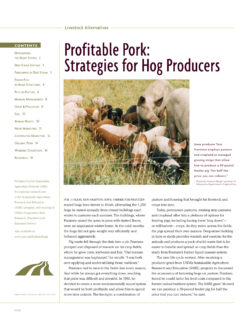Given the consolidation climate in the hog industry and the low profit margins for pork, cooperating with other producers to market meat offers a profitable alternative for small and medium-sized farmers.
Patchwork Family Farms, a marketing cooperative supported by the Missouri Rural Crisis Center, rewards 15 pork producers for their dedication to 'sustainable' and 'humane' growing standards with a fair price, regardless of the market. The market for this Missouri pork is hot. The co-op has seen a doubling in sales volume each year since it was founded in 1994. In 2000, Patchwork earned $250,000 in gross sales.
Patchwork's expansion has been steady. Originally, the co-op sold to three restaurants. Today, it sells pork to about 40 restaurants, grocery stores, at community events and directly from the co-op's Columbia office. 'It has taken a lot of knocking on doors,' said Lindsay Howerton, Patchwork marketing coordinator. 'We have tremendous success with the media. I'll send out a press release and suddenly I'll have three TV stations in our yard.'
Howerton attributes the intense interest to the co-op's unique pricing structure 43 cents per pound or 15 percent over market price and dedication to raising pork not in confinement, without hormones and without continuous feeding of antibiotics. 'We've stepped out of the system,' Howerton said, 'and are being extremely successful at it.'
In 2000, Patchwork producers received $50,000 more than if they had sold their hogs on the open market. Producers saw these payments up front, not after the product was sold. Ovid and Mary Jo Lyon, Patchwork producers for several years, have seen the economic benefits.
'Patchwork supports independent family farmers; we just couldn't continue to raise hogs without this project,' said Mary Jo Lyon. 'Patchwork gives my family a way to produce hogs in the same way we always have, out in the open with plenty of sunshine, and we get a fair price for our hogs.'
Other hog producers in Missouri may have an opportunity to tap niche markets, thanks to A Family Farm Pork Cooperative, which has researched consumer support for the concept. What began as a small project blossomed to serve producers in 20 counties with a pork slaughtering plant and a cooperative marketing plan, initially in the St. Louis area.
Feasibility studies for value-added pork, 'have shown this will be a good venture,' said Russell Kremer, president of the Missouri Farmers Union and co-op director, who received a SARE grant to explore alternative ways to distribute Missouri-grown food. Producers interested in the slaughtering plant have offered some 250,000 hogs per year.
'A common strategy to gain and maintain better access to slaughter markets was pooling several different producers' hogs in a single load and providing such loads on a regular basis,' Kremer said. The co-op serves small- and medium-sized producers who combine genetics, nutrition and other management strategies to meet quality standards. 'If you want a cooperative venture like this to be successful, producers have to communicate from the very beginning,' he said.
With start-up help from a SARE grant, a farmer-owned meat marketing cooperative is netting top dollar for its products and providing its 52-member farms with crucial income. Vermont Quality Meats now sells more than $1,000 a day worth of New England lamb, goat meat, pork, veal, venison and game birds most of it to upscale New York and Boston restaurants at double regular auction sale prices. The cooperative has put between $100,000 and $150,000 extra profit into the pockets of producers, estimates diversified livestock farmer Lydia Ratcliff.
Cooperative members benefit from both lower production costs and higher sales prices by meeting market demand for significantly younger animals. About 10 part-time jobs have been created through the project, all of which are filled by co-op members, further supplementing farm income. 'Our farmers are also getting the reward of knowing they're producing such fine products that their efforts are being recognized by some of the most distinguished chefs in the country,' Ratcliff said.
Minnesota crop and livestock farmer Carmen Fernholz sells hogs on the conventional market through a buying station that he operates about 10 miles from his family farm. To obtain advance contracts, most producers need to supply 40,000 pounds of carcass, or 225 head, which can carve small producers out of the market.
By pooling their product, the hog producers with whom Fernholz works are able to secure their market price in advance. Between 1997 and 2000, the station served up to 50 farmers in a 30-mile radius. Under the arrangement, farmers let Fernholz know how many head they have to sell. Fernholz then coordinates truck transportation and works with a National Farmers Organization office in Ames, Iowa, to secure a buyer. Farmers bring about 50 to 100 hogs to the buying station for shipping each week.
'We were losing market access, and that was critical,' Fernholz says. 'If a group of us can each contribute 20 to 25 head toward a forward contract then we can all price-protect ourselves.'
